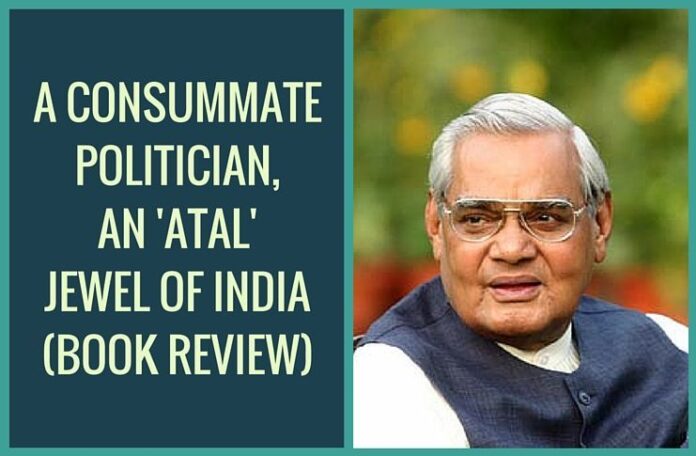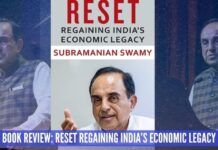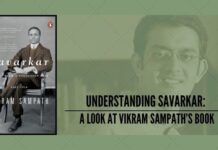
[dropcap color=”#008040″ boxed=”yes” boxed_radius=”8px” class=”” id=””]H[/dropcap]e was often called “a right man in a wrong party”, but the label, though snappy, couldn’t have been more wrong. Atal Bihari Vajpayee never repudiated his political past or moorings and instead tried to make his party as broad based and inclusive as possible in line with his country’s diversity.
In politics, apart from his impressive, impassioned oratory and stellar parliamentary career, he was always known for never bearing a grudge, being respectful but never being overawed by even titanic figures, and considerate and conciliatory towards his opponents.
As one story goes, Manmohan Singh, then finance minister, was roundly upbraided in the Lok Sabha by Vajpayee on some issue and was so upset that he went to Prime Minister P.V. Narasimha Rao to submit his resignation. A canny Narasimha Rao defused the situation by calling up Vajpayee to request he talk to Manmohan Singh and mollify him, which the Bharatiya Janata Party leader was only glad to do.
That was Vajpayee’s enduring and endearing characteristic, as this much-needed biography of one of the tallest and well-regarded leaders of free India brings out.
Vajpayee, who began his political career when Jawaharlal Nehru still strode large, had plenty of respect for the prime minister but was never afraid to confront him in parliament, and tales of Nehru praising Vajpayee to visiting foreign dignitaries are well-known. One incident that may not be that known is recounted in this short but incisive narrative by journalist-cum-author Kingshuk Nag.
In the 1962 general elections, the Congress decided to ensure Vajpayee’s defeat in Uttar Pradesh’s Balrampur constituency and even roped a noted Bollywood personality (no one glamorous but rather the cerebral Balraj Sahni) to campaign for its charismatic candidate, Subhadra Joshi. Nehru however refused all entreaties to campaign there, to avoid taking on Vajpayee directly, whose interest in foreign affairs he admired. (She won, by the way)
Vajpayee had dubbed Indira Gandhi “Durga” in 1971 and admired her courage but was strident in his opposition towards her drift towards authoritarianism which culminated in the Emergency. It is a telling point that she had consulted him before “Operation Bluestar” – though she didn’t end up following his advice not to go ahead.
And he was both personally and politically brave – as this book reveals, he was one of the few politicians to confront anti-Sikh rioters in November 1984. On November 1, Vajpayee, who came out after hearing a commotion outside his official residence, dissuaded a mob from attacking a Sikh-owned taxi stand, and stood there till they dispersed.
As prime minister, he tried thrice to make peace with Pakistan, and succeeded, to some extent. He also took some visionary steps for resolving the vexed issue of Kashmir, which he had firsthand experience of, as Nag notes, right from the start of his political career when he was aide to Jana Sangh founder Syama Prasad Mookerjee.
But as this brings out, Vajpayee’s biggest legacy will be his pragmatism, especially not to abandon successful or necessary policies of past governments, ability to withstand pressure from extreme factions of his party and skill in forging political consensus, and ushering in a new paradigm of coalition politics – and see the first such government complete its term.
This biography, which on the whole presents a balanced view (sympathetic at times but never gushingly adulatory), deals with both Vajpayee’s personal and political life. His feud with Balraj Madhok over heading the Jana Sangh, his poetry, his foster-family may be known, but less known might be incidents like his (unsuccessful) petition to the Lok Sabha speaker in 1980s for removal of finance minister Pranab Mukherjee, otherwise a close friend, on the grounds that a Rajya Sabha member with no power to vote on financial bills had no moral right to the post!
Conferred the nation’s highest awards – the Padma Vibhushan in 1992 (by a Congress government) and Bharat Ratna in 2014, Vajpayee only lacked one more tribute – a nuanced biography and Nag, who has penned books on the Telangana agitation, the BJP’s rise, and a biography of Narendra Modi, has filled the gap. It may not be a definitive account but is definitely a vivid picture of this fascinating man.
Title: Atal Bihari Vajpayee – A Man for All Seasons; Author: Kingshuk Nag; Publisher: Rupa Publications; Pages: 192; Price:Rs. 395
(IANS)
- Pentagon cancels aid to Pakistan over record on militants - September 2, 2018
- The curious case of Tamil Nadu’s opposition to NEET - September 4, 2017
- If 2.6 Billion People Go To War: India vs. China - July 22, 2017










